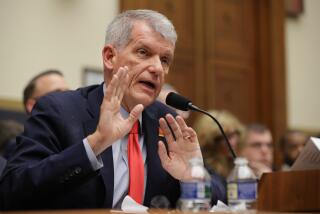Kenneth Lay Resigns as Enron Chairman
- Share via
HOUSTON — Kenneth L. Lay was ousted Wednesday from Enron Corp., the Houston company that he spent 15 years building into the world’s largest energy trader only to watch it crumble amid allegations of financial trickery.
Enron announced it is beginning a search for a turnaround specialist to save what is left of what was once the nation’s seventh-largest company, but which now holds the dubious distinction of having filed the largest-ever bankruptcy petition.
Lay said his decision to resign as chairman and chief executive was reached in cooperation with Enron’s board and the 15-member creditors’ committee selected as part of Enron’s bankruptcy proceedings. Enron filed for bankruptcy protection Dec. 2, listing more than $50 billion in assets and more than $31 billion in debts.
The bank-dominated creditors’ committee had been pushing for Lay’s resignation so that new managers could oversee Enron’s attempt to reorganize and repay the money it owes, sources familiar with the situation said. The decision was reached Wednesday morning during a board meeting with Enron’s far-flung directors checking in by telephone.
“The creditors just want a green-eyeshade guy who gets their money back for them,” one source said.
Lay will remain a director of the company.
“I want to see Enron survive, and for that to happen we need someone at the helm who can focus 100% of his efforts on reorganizing the company and preserving value for our creditors and hard-working employees,” Lay said in a statement. “Unfortunately, with the multiple inquiries and investigations that currently require much of my time, it is becoming increasingly difficult to concentrate fully on what is most important to Enron’s stakeholders.”
Lay, 59, has been named in more than 50 lawsuits, and his company’s disintegration is being investigated by several congressional committees, the Justice Department and the Securities and Exchange Commission.
That Lay was tossed out comes as less of a surprise than the leisurely time it took to do it, Enron watchers said.
Lay held on as a series of damaging financial disclosures about murky off-balance-sheet partnerships and overstated earnings hammered Enron’s stock price, wiping out billions of dollars of investor holdings and the retirement savings of Enron employees.
Lay survived a failed last-ditch merger attempt with cross-town rival Dynegy Inc., which fled claiming that it hadn’t realized the depths of Enron’s troubles. He lasted as Enron’s debt plunged to junk status and lenders turned their backs, causing an all but fatal cash crunch that pushed Enron into bankruptcy.
But the heat rose in the last few weeks with revelations that Lay and other Enron executives contacted Bush administration officials late last year seeking help for the flailing company, that Lay was touting the stock to employees and urging them to buy shortly before Enron announced its worst quarter in corporate history, that Lay was warned in August by a company vice president of a possible corporate implosion if details of the off-balance-sheet transactions became known and that documents were shredded by Enron employees and those of its auditor, Andersen.
“For whatever value remains in Enron to be realized, Lay’s resignation was necessary,” said Edward Muller, an investor in energy ventures and former president of Irvine-based Edison Mission Energy. It was necessary because “Lay’s presence, with an obvious personal interest, stood in the way of decisions being made to realize value for creditors and move the organization forward.”
Prudential Securities analyst Carol Coale said the decision comes too late and is likely to play poorly on Wall Street.
“When Wall Street was calling for Ken Lay’s head, it was early in the game,” said Coale, who is based in Houston and has followed Enron closely. “Wall Street thought that would be the responsible thing for the board to do. But at this point, it makes him look guilty.”
“I don’t think the market’s going to react favorably to that,” she said, noting that the company’s stock took a steep plunge when CEO Jeffrey Skilling resigned abruptly in August. Enron, which little more than a year ago traded at nearly $90 a share on the New York Stock Exchange, closed Wednesday at 34 cents in over-the-counter trading, down 9.5 cents. Lay’s resignation was announced after markets closed.
The reaction from Enron employees, current and former, was bitter.
“It was bound to happen,” said Maritta Mullet, a former 10-year employee who lost nearly half a million dollars in would-be retirement benefits. “I’m surprised he’s been able to face up to all these people and stay in there so long.
“I feel terribly betrayed by him,” added Mullet, who said Lay was “blushing over with how good everything looked” in a September online chat with employees.
That enthusiasm cost her and others dearly.
Rumors had swirled in recent days that a new management team was about to be named, perhaps to be led by Jeffrey McMahon, Enron executive vice president and chief financial officer. McMahon was named to those posts in late October, replacing Andrew Fastow, who helped engineer the off-balance-sheet partnerships that greased Enron’s slide into bankruptcy.
McMahon was treasurer in 2000 and reportedly objected to the conflicts of interest caused by Fastow’s twin roles as Enron chief financial officer and manager of two of the partnerships. McMahon then moved to a small Enron subsidiary but was brought back in a futile attempt to calm investors.
With Lay’s departure, McMahon would be the only remaining member of Enron’s three-person office of the chairman. The third member, Enron President Lawrence Greg Whalley, is leaving Enron to run the trading operation that Enron is selling to UBS Warberg in a noncash profit-sharing deal.
Enron officials have touted the pending sale of the company’s trading operation to UBS as the beginning of a new future. The deal was blessed by the U.S. Bankruptcy Court on Friday, and UBS has already extended job offers to 640 Enron employees.
Still, if Enron management believes the company can move forward more smoothly and reorganize without Lay, Mullet and others are doubtful.
“I didn’t think the company could survive with him staying. But I don’t think the company can survive either way,” she said. “I don’t see what’s left.”
“It’s about time,” said one former Enron vice president who spent four years at the company. “I think he’s entirely culpable. He knew what was going on. He was responsible. He was captain of the ship.”
The former vice president, who asked not to be named, said the board of directors has been passive and should have acted sooner.
“I was wondering when they were going to get around to it. I’ve been shocked that the [Bankruptcy] Court allowed the same management to stay in place. It seems like the shredded documents were the last straw.”
One current Enron finance executive said, “Good. Now they can start cleaning house. He’s a great guy, but he fell asleep at the wheel a bit. There has to be someone taking some responsibility here, and he’s chairman.”
Enron spokesman Mark Palmer said he did not know what kind of retirement package Lay was being given, but noted that any agreement would have to be approved by the Bankruptcy Court.
Lay earned hundreds of millions of dollars at Enron, primarily through lucrative stock options in recent years.
In 2000, Lay exercised options worth $123.4 million, according to Enron filings with the Securities and Exchange Commission. His base salary that year was $1.3 million, and he was given a $7-million bonus.
At the end of 2000, Lay held 5.1 million options worth $257.5 million, and an additional 1.5 million options worth more than $100 million that were scheduled to vest in coming years, according to the SEC documents.
However, the plunge in Enron’s stock price probably renders any unexercised options worthless.
Lay received a $3.6-million bonus in January 2001. The company has not released figures relating to his 2001 salary and option grants.
*
Contributing to this story were Times staff writers David Streitfeld and Lee Romney in Houston and Walter Hamilton and James Flanigan in Los Angeles.
More to Read
Inside the business of entertainment
The Wide Shot brings you news, analysis and insights on everything from streaming wars to production — and what it all means for the future.
You may occasionally receive promotional content from the Los Angeles Times.











